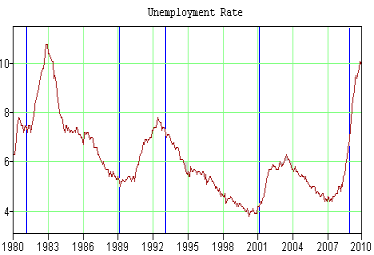
… the risks created by the housing bubble were strongly concentrated in the financial sector. As a result, the collapse of the housing bubble threatened to bring down the nation’s banks. And banks play a special role in the economy. If they can’t function, the wheels of commerce as a whole grind to a halt. Why did the bankers take on so much risk? Because it was in their self-interest to do so. By increasing leverage — that is, by making risky investments with borrowed money — banks could increase their short-term profits. And these short-term profits, in turn, were reflected in immense personal bonuses. If the concentration of risk in the banking sector increased the danger of a systemwide financial crisis, well, that wasn’t the bankers’ problem.
Of course, that conflict of interest is the reason we have bank regulation. But in the years before the crisis, the rules were relaxed — and, even more important, regulators failed to expand the rules to cover the growing “shadow” banking system, consisting of institutions like Lehman Brothers that performed banklike functions even though they didn’t offer conventional bank deposits. The result was a financial industry that was hugely profitable as long as housing prices were going up — finance accounted for more than a third of total U.S. profits as the bubble was inflating — but was brought to the edge of collapse once the bubble burst. It took government aid on an immense scale, and the promise of even more aid if needed, to pull the industry back from the brink.
And here’s the thing: Since that aid came with few strings — in particular, no major banks were nationalized even though some clearly wouldn’t have survived without government help — there’s every incentive for bankers to engage in a repeat performance. After all, it’s now clear that they’re living in a heads-they-win, tails-taxpayers-lose world. The test for reform, then, is whether it reduces bankers’ incentives and ability to concentrate risk going forward.
Transparency is part of the answer. Before the crisis, hardly anyone realized just how much risk the banks were taking on. More disclosure, especially with regard to complex financial derivatives, would clearly help. Beyond that, an important aspect of reform should be new rules limiting bank leverage. I’ll be delving into proposed legislation in future columns, but here’s what I can say about the financial reform bill the House passed — with zero Republican votes — last month: Its limits on leverage look O.K. Not great, but O.K. It would, however, be all too easy for those rules to get weakened to the point where they wouldn’t do the job. A few tweaks in the fine print and banks would be free to play the same game all over again. And reform really should take on the financial industry’s compensation practices. If Congress can’t legislate away the financial rewards for excessive risk-taking, it can at least try to tax them.
Let me conclude with a political note. The main reason for reform is to serve the nation. If we don’t get major financial reform now, we’re laying the foundations for the next crisis. But there are also political reasons to act. For there’s a populist rage building in this country, and President Obama’s kid-gloves treatment of the bankers has put Democrats on the wrong side of this rage. If Congressional Democrats don’t take a tough line with the banks in the months ahead, they will pay a big price in November.
| in⋅dus⋅try [in-duh-stree] | |
| –noun, plural in⋅dus⋅tries for 1, 2, 7 | |
| 1. | the aggregate of manufacturing or technically productive enterprises in a particular field, often named after its principal product: the automobile industry; the steel industry. |
| 2. | any general business activity; commercial enterprise: the Italian tourist industry. |
| 3. | trade or manufacture in general: the rise of industry in Africa. |
| 4. | the ownership and management of companies, factories, etc.: friction between labor and industry. |
| 5. | systematic work or labor. |
| 6. | energetic, devoted activity at any work or task; diligence: Her teacher praised her industry. |
| 7. | the aggregate of work, scholarship, and ancillary activity in a particular field, often named after its principal subject: the Mozart industry. |
| 8. | Archaeology. an assemblage of artifacts regarded as unmistakably the work of a single prehistoric group. |
I believe Obama needs a Frances Perkins type. Perkins was Gov. Roosevelt’s state industrial commisioner of NY and first woman cabinet member when President Roosevelt named her secretary of Labor. There’s a new book about her detailing how she was able to push forward FDr’s New Deal. She was tough but brillant.
Amen re Frances Perkins. Now whom do we have that could fill that bill? Elizabeth Warren seems pretty smart and sensible to me. Let’s put her in Geithner’s place and replace Larry Summers with Paul Krugman.
Good choices! Maybe Obama will read you comments and do what you say…
Well, if he does, it will be because he’s reading YOUR blog.